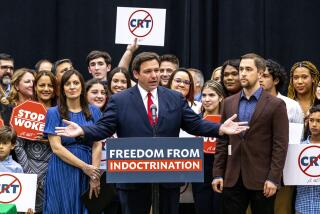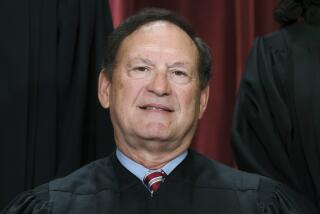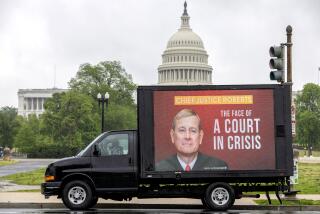WASHINGTON INSIGHT
WIDE NET: Rep. Henry A. Waxman is the tobacco industry’s most prominent congressional nemesis, so it came as no small surprise when an aide to the Los Angeles Democrat was asked by a Washington headhunting firm to recommend candidates to be legislative counsel at the world’s largest tobacco company, Philip Morris. S. Hope Johnson, a vice president of the Interface Group recruiting firm, said the letter to Waxman aide Philip Barnett was not sent by mistake. The agency wanted to cast a wide net, she said, “to let people be aware of an opportunity. You never know.” If that’s the case, says Phil Schiliro, Waxman’s chief aide, the company should hire C. Everett Koop, the former U.S. surgeon general who was an outspoken critic of smoking.
*
THE ‘R’ WORD: A little-noticed aspect of last week’s landmark Supreme Court ruling in Adarand vs. Pena is that the majority opinion did not use the phrase “affirmative action.” Instead, Justice Sandra Day O’Connor, the author of the opinion, said the court was concerned with “race-based governmental action” and “all racial classifications” imposed by government. The conservative justices have indicated they think the phrase “affirmative action” is a hazy term that means different things to different people.
*
O.J. RIPPLES: TV coverage of the O.J. Simpson case has reached far and wide, including into the confidential deliberations of senior judges debating the merits of TV in federal courts. The U.S. Judicial Conference recently surprised many by canceling television coverage of some federal civil trials. The panel of senior judges, which meets twice a year at the Supreme Court, did not explain its action, but sources familiar with the proceedings point to TV coverage in the Simpson case. Critics had argued that TV changes the nature of a court proceeding and, sources say, the Simpson case convinced the group that the critics were right.
*
MORE THREATS: The bombing of the Alfred P. Murrah Federal Building in Oklahoma City continues to fuel imaginations on the fringe of American society. Since the April 19 blast, 233 bomb threats have been made against federal buildings across the country, the General Services Administration reports. That compares to 190 in all of 1994.
*
TOP TARHEEL: North Carolina Democrats who lost four House seats and a slew of state and local offices in the 1994 midterm elections are hoping for a comeback in the presidential election year of 1996. Yet for help they are looking not to President Clinton but to their own governor, James B. Hunt Jr., whose recent approval rating of 74% put him about 30 points ahead of Clinton and in the top three among the nation’s governors. Hunt’s high standing marks a dramatic personal comeback from his bitter, costly and unsuccessful effort to unseat GOP Sen. Jesse Helms in 1984. Hunt built popularity by stealing Republican thunder on such issues as taxes and crime, while promoting education and welfare issues. In other words, his admirers say, he is turning out to be the “different kind of Democrat” Clinton promised to be.
*
GOOD ADVICE: Perhaps after nearly four years of war in Bosnia, some Americans still didn’t get the message. So as tensions mounted following the capture by Bosnian Serbs of hundreds of United Nations peacekeepers, the Clinton Administration issued a travel advisory: “The Department of State warns U.S. citizens not to travel to the Republic of Bosnia-Herzegovina because of increased hostilities.”
More to Read
Sign up for Essential California
The most important California stories and recommendations in your inbox every morning.
You may occasionally receive promotional content from the Los Angeles Times.











